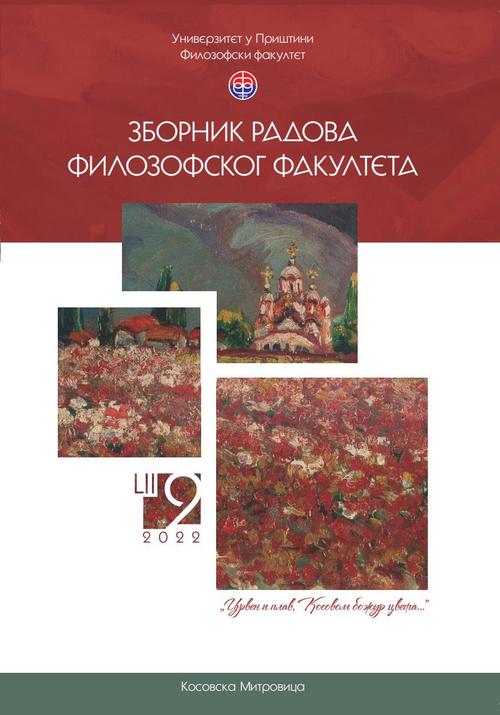Bibliotherapy in a School Context
Abstract
The goal of bibliotherapy is to use a book to help the reader understand and overcome the difficulties he or she is facing. It can be applied in different contexts. If it is applied in a school environment, we are talking about developmental bibliotherapy.
The aim of this paper is to describe the basic stages of developmental bibliotherapy, to present the results of research that indicate the effectiveness of its application, as well as the results of research that refer to the inclination of teachers and associates to opt for this technique.
Given that this technique is considered to be a simple, cost-effective, and efficient intervention, and that some teachers and associates do not venture to apply it because they lack the necessary knowledge and skills, the inclusion of bibliotherapy in college training programs could contribute to the increased readiness of professionals to use it in order to help children face challenges in a developmentally appropriate manner.
References
Митровић, Ј. (2013). Примена библиотерапије у школској библиотеци. Читалиште, 62–69.
Andreou, E., Paparoussi, M., & Gkouni, V. (2013). The Effects of an Anti-Bullying Bibliotherapy Intervention on Children’s Attitudes and Behavior. Global Journal of Arts Humanities and Social Sciences, 1 (4), 102–113.
Başarı, Ş. & Latifoğlu, G. (2021). Evaluation by Students of Bibliotherapy Technique Used in Group Guidance Activities. Laplage em Revista, 7 (2), 145–157.
Byrd, J. A., Washington, A. R., Williams, J. M., & Lloyd, C. (2021). Reading Woke: Exploring How School Counselors May Use Bibliotherapy with Adolescent Black Boys. Professional School Counseling, 25 (1c), 1–12.
Bland, C. M. (2013). A Case Study of General Education Teacher Use of Picture Books to Support Inclusive Practice in The Primary Grades of an Inclusive Elementary School (Doctoral dissertation). Greensboro: University of North Carolina.
Cameron, L. & Rutland, A. (2006). Extended Contact Through Story Reading in School: Reducing Children’s Prejudice Toward the Disabled. Journal of Social Issues, 62(3), 469–488.
Cameron, L., Rutland, A., Brown, R., & Douch, R. (2006). Changing Children’s Intergroup Attitudes Toward Refugees: Testing Different Models of Extended Contact. Child Development, 77 (5) 1208–1219.
Camp, R. D. (2015). Perceptions of Bibliotherapy: А Survey of Undergraduate Students. (Doctoral dissertation). Ames: Iowa State University.
Carlson, R. (2001). Therapeutic Use of Story in Therapy with Children. Guidance & Counselling, 16 (3), 92–99.
Coleman, M. & Ganong, L. H. (1990). The Uses of Juvenile Fiction and Self-Help Books with Stepfamilies. Journal of Counseling & Development, 68, 327–331.
Cook, K. E., Earles-Vollrath, T., & Ganz, J. B. (2006). Bibliotherapy. Intervention in School and Clinic, 42 (2), 91–100.
Forgan, J. W. (2002). Using Bibliotherapy to Teach Problem Solving. Intervention in School and Clinic, 38 (2), 75–82.
Goddard, A. T. (2011). Children’s Books for Use in Bibliotherapy. Journal of Pediatric Health Care, 25 (1), 57–61.
Heath, M. A., Sheen, D., Leavy, D., Young, E., & Money, K. (2005). Bibliotherapy: A Resource to Facilitate Emotional Healing and Growth. School Psychology International, 26 (5), 563–580.
Herbert, T. P. & Furner, J. M. (1997). Helping High Ability Students Overcome Math Anxiety Through Bibliotherapy. Journal of Secondary Gifted Education, 8, 164–179.
Hoffman, E. M., Marlowe, M. J., Scharf, K. H., Disney, G. H., Macer, A., Poling, D., & Queen, A. (2015). Using Torey Hayden’s Teacher Stories to Teach Relationship Skills in Special Education Teacher Preparation. Teacher Education Quarterly, 42 (2), 65–85.
Hubin, A., De Sutter, P., & Reynaert, C. (2011). Bibliotherapy: An Effective Therapeutic Tool for Female Sexual Dysfunction?. Sexologies, 20 (2), 88–93.
İlter, B., Leana-Taşcılar, M. Z., & Saltukoğlu, G. (2018). The Effects of the Bibliotherapy Technique on Perfectionism Levels in Gifted Children: An Experimental Study. European Journal of Education Studies, 4 (2), 153–176.
Kingsley, N. E. (2017). Effectiveness of Role Play and Bibliotherapy in Attitude Change of Primary School Pupils Towards Learners with Special Needs in Nigeria. Disability, CBR & Inclusive Development, 27 (4), 93–105.
Klarić, M. (2013). Terapeutske priče u inkluzivnim skupinama iz perspektive odgajatelja (završni rad). Rijeka: Sveučilište u Rijeci, Učiteljski fakultet.
Lea, B. (2015). Children’s Books About Special Needs Used as a Mediating Tool, the Perceptions of Inclusion Classroom Teachers in Mainstream Schools. Higher Education Studies, 5 (1), 51–62.
Lipschultz, H. (2012). Bibliotherapy: A Literature Review, 1–13. Retrieved from: http://hollythelibrarian.com/wp-content/uploads/2012/10/Bibliotherapy-literature-review.pdf
Maich, K. & Kean, S. (2004). Read Two Books and Write me in the Morning: Bibliotherapy for Social Emotional Intervention in the Inclusive Classroom. Teaching Exceptional Children, 1 (2), 5–11.
Marlowe, M. & Maycock, G. (2001). Using Literary Texts in Teacher Education to Promote Positive Attitudes Toward Children With Disabilities. Teacher Education and Special Education, 24 (2), 75–83.
Marković, A. S. (2015). Razvojna biblioterapija u kontekstu potreba savremenog deteta. Sinteze, 7, 53–70.
Olsen, M. A. (2006). Bibliotherapy: School Psychologists’ Report of Use and Efficacy (Doctoral dissertation). Provo: Brigham Young University.
Pardeck, J. A. (2014). Using Books in Clinical Social Work Practice: A Guide to Bibliotherapy. Routledge.
Pardeck, J. T. (1993). Literature and Adoptive Children with Disabilities. Early Child Development and Care, 91, 33–39.
Pehrsson, D. & McMillen, P. S. (2005). Competent Counselor Practice for Use of Bibliotherapy. WACES Wire, 43 (2), 1–5.
Prater, M. A., Dyches, T. T., & Johnstun, M. (2006). Teaching Students about Learning Disabilities Through Children's Literature. Intervention in School and Clinic, 42 (1), 14–24.
Routel, C. (2009). The Impact of Children's Literature and Discussion on Attitudes Toward Disability (Doctoral dissertation). Ypsilanti: Easter Michigan University.
Sawyer, W. (2000). Growing up with Literature (3rd ed.). Albany, NY: Delmar.
Sridhar, D. & Vaughn, S. (2000). Bibliotherapy for All Enhancing Reading Comprehension, Self-Concept, and Behavior. TEACHING Exceptional Children, 33 (2), 74–82.
Tofaha, J. A. (2012). The Effect of Bibliotherapy Intervention Program on Self Esteem of Gifted Primary School Children. International Journal of Psycho-Educational Sciences, 63–70.
The details about the publication policy, including copyright and licensing, are available at:

